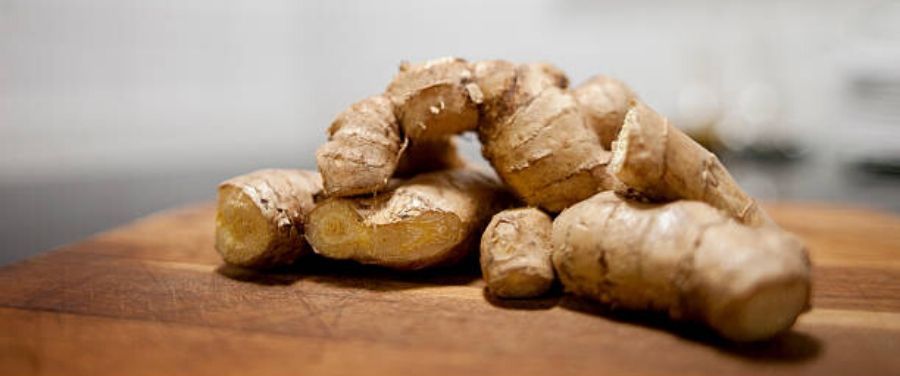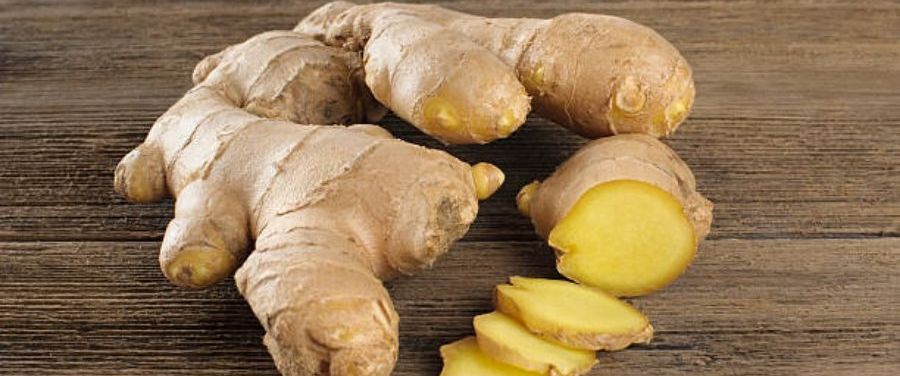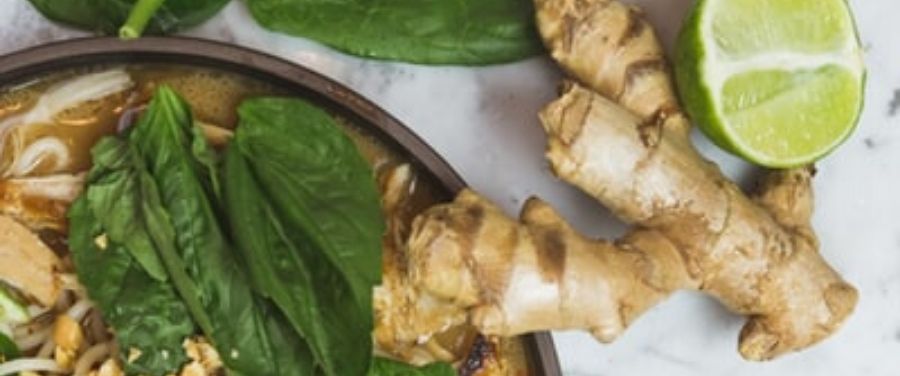Ginger is the healthiest and delicious spices on the planet. it is loaded with healthy nutrients and many bio-active compounds that have powerful benefits for your brain and body. In fact, ginger is one of the most commonly consumed dietary spices in the world. In India, It’s been using since 3000 years back in India. It’s been used for thousands of years as a remedy for diverse health issues, like arthritis, colds, nausea, migraines pain and high blood pressure.
Ginger also fights microbes and reduces inflammation, because it is a strong anti-oxidant. A great portion of ginger and its metabolites accumulate in the gut. That’s why it’s most commonly used for gastrointestinal issues. It’s a great food to eat when following the lectin avoidance diet. Over 100 active compounds have been identified in ginger, fresh or dried.
Gingerols, the major compounds that are available in fresh ginger than dry ginger. Shogaols are produced from gingerols during the drying process. Ginger also contains zerumbone, pungent oleoresins, zingerone, some flavonoids and terpenoids.
All of these compounds are antioxidants, while some of them have anti-inflammatory, pain-relieving, anti-tumor, antimicrobial, and liver-protecting activities.
HEALTH BENEFITS OF GINGER:
1. Reduces Inflammation:
According to studies, ginger reduces the inflammation marker CRP in the blood. The dose ranged from 1 to 3 grams / day, supplemented over 2-3 months. It seems to be the pungent components in ginger, also known as oleoresins, that have the strongest anti-inflammatory effects based on animals and cellular studies.
One of ginger’s pungent components blocked a pathway (NF-κB) that reduces activity of inflammatory genes in the immune cells. Like NSAIDs (aspirin and Advil), ginger blocks inflammation- and pain-causing COX enzymes.
This way, ginger reduced the production of inflammatory chemicals (called leukotrienes and prostaglandins) in the cells and test tubes. Ginger stopped the release of inflammatory cytokines in the immune cells. It could reduce important inflammation-causing TNF-alpha, as well as IL-1 beta.
2. Helps with Menstrual Cramps:
Ginger reduced the PMS and menstrual pain in 6 trials. It was much more effective than placebo and as effective as a pain-killer commonly used for menstrual cramps (mefenamic acid, an NSAID). All studies used powdered form of ginger at 750 mg-2,000 mg/day. It was most commonly used during first 3 days of menstruation.
3. May Help with Osteoarthritis:
Ginger improved osteoarthritis symptoms in some studies. In one large study of 261 people with osteoarthritis (DB-RCT), a standardized ginger extract could reduce symptoms over 6 weeks. Extract was safe and caused only mild stomach upset. In another study of 75 people with osteoarthritis (DB-CT), ginger was effective only short-term, but benefits were not sustained.
The discrepancy could also be due to different ginger extracts used. More research is needed to determine if ginger alone can help people suffering from the osteoarthritis.
4. May Help with Allergies and Asthma:
Ginger is probably better for people with Th2 dominance. Zerumbone, an active ingredient in ginger, enhanced the Th1 and reduced the Th2 response in mice with the allergic asthma. It decreased production of various Th2 immune substances, helping rebalance the immune system and reduce allergies. Ginger—treated mice had asthmatic symptoms, mucus and lung inflammation.

Additional animal studies validate this traditional ginger use. Ginger helped improve the asthma symptoms by suppressing the Th2 immune response and airway inflammation in mice. It could even affect activity of genes that perpetuate Th2 dominance, possibly with long-term benefits.
5. Ginger is a Natural Painkiller:
Ginger is an effective and safe natural pain-killer, according to a review of 7 studies that focused on athletes (SR of RCTs). A ginger dose of roughly 2 g / day may modestly reduce the muscle pain from heavy exercise if taken for at least 5 days.
Ginger worked as well as popular painkiller diclofenac (an NSAID also known as Voltaren) in a study of 43 people (RCT). The participants took a ginger extract (340 mg) for four weeks. Unlike diclofenac, ginger didn’t damage stomach lining or cause digestive dis-comfort.
6. Helps with Eczema:
6-Shogaol, a ginger compound, reduced the eczema in mice. TNF—alpha plays a role in eczema symptoms, such as redness and the skin eruptions. Interestingly, eczema is a mixed Th2/Th1 condition, and ginger managed to keep all the inflammatory immune substances and the pathways under control.
7. Helps with Nausea and Vomiting:
Ginger is a popular natural remedy for morning sickness during the early pregnancy. According to a review of 6 studies (RCTs), about 1 g/day reduces the morning sickness five—fold if used for at least 4 days in a row. Effects of ginger on the nausea are linked to vagus nerve, the activation of which is usually beneficial. However, over-activating some serotonin receptors (5HT3) in the vagus nerve pathway to the gut causes nausea and vomiting.
Ginger reduces the nausea and vomiting probably by blocking excess serotonin and vagus nerve activation in the stomach and gut, based on the tissue and cellular studies. Many chemotherapy drugs cause the nausea by increasing gut serotonin, which ginger may help safely counteract. HIV medications also cause nausea. Ginger (1 gram / day) given before the medications improved both the mild and severe nausea in a study of 105 HIV positive people after 2 weeks.
8. Reduces Stomach Discomfort:
Ginger has a long history of use for the digestive disorders. It can both increase the gut flow to boost digestion and alleviate painful stomach spasms. Ginger helps with the indigestion. In 126 people with indigestion (DB-RCT), a combination of ginger and artichoke improved digestion, bloating, nausea and stomach pain after 4 weeks.
It increased the stomach emptying in a study of 24 healthy people (DB-RCT). Each person took 1,200 mg of ginger in a capsule form before a meal. Ginger increased antioxidant enzymes, improved digestion and reduced cortisol in rats with the irritable bowel syndrome. Most active components in ginger enhanced the digestion in animal studies.
Since ginger has over 100 active components, some of them could also relax the gut in animal studies, which could help with the painful stomach spasms. Ginger probably doesn’t help with the gallbladder issues. It didn’t have any effect on gallbladder in a small study of 19 people (DB-RCT).
9. Protects Liver:
Ginger Protects from the Drugs and Heavy Metals:
Ginger (500 mg/day) helped to protect liver from toxic antituberculosis drugs in a study of 60 people with the tuberculosis (RCT). It helped to slow down aging-related liver damage in old rats. It was compared to alpha-lipoic acid, which had even the stronger effects.
Ginger may protect from detrimental effects of the heavy metals and drugs on the liver. It protected both the liver and kidneys against cadmium toxicity in poisoned rabbits and from aluminum toxicity in the rats. It also prevented the liver damage and scarring from painkillers such as piroxicam in the mice.
Ginger Helps with Non-Alcoholic Fatty Liver Disease:
Ginger (2 g/day) greatly improved liver health, reduced inflammatory cytokines, liver enzymes and improved insulin resistance in 44 patients with non-alcoholic fatty liver disease after 12 weeks (DB-RCT). Ginger essential oil prevented the liver disease and maintained healthy lipid levels in obese mice fed a high-fat diet. It also improved the fatty liver disease and high triglycerides in the rats by “turning off” fat-producing liver genes.

10. Protects Stomach:
Ginger increased the protective prostaglandins in the stomach lining in 43 osteoarthritis patients who used NSAIDs long-term (RCT). NSAIDs cause stomach damage by reducing prostaglandins in stomach, which otherwise help to maintain healthy stomach mucus. Since this is a big issue with long-term NSAIDs use, ginger could be an effective and safe alternative.
Cellular studies confirm that ginger reduces the stomach damage. Antioxidants in ginger blocked the growth of stomach—ulcer—causing H.Pylori, mainly by fighting the free radicals.
11. Protects DNA:
Ginger protected sperm DNA against the oxidative damage in a study of 100 infertile men (DB-RCT). All the men took 500 mg of ginger powder daily for 3 months, after which their sperm DNA quality greatly increased. Ginger’s DNA-protective effects are not important only for the fertility. Ginger essential oil also reduced DNA damage from a mold toxin (aflatoxin B1) in the cells.
12. Supports Heart Health:
Ginger can reduce an important inflammation marker, reduce triglycerides and increase HDL and according to a review of 9 clinical studies. Taken together, this means that ginger may protect heart and prevent heart disease. It also lowered the blood pressure in rats by relaxing the blood vessels. 6—Gingerol can protect the blood vessel cells from oxidative stress, which may help prevent hardening of the arteries.
13. Ginger is An Antioxidant:
Many active components in the ginger and its essential oils, such as gingerol and shogaol, are potent antioxidants. They can scavenge the free radicals throughout body and neutralize them — crucial for preventing numerous chronic disease.

This antioxidant activity underlies immune-balancing and the tumor-fighting benefits of ginger, demonstrated in animal and cell studies. Shogaol activated the detox hub — Nrf2 — in the brain cells, which may potentially protect from the neurodegenerative diseases like Alzheimer’s.
When added to anti-tuberculosis therapy in 69 people (RCT), 3 gram of ginger daily boosted antioxidants and reduced the inflammation. By combating inflammation, the biggest lung-damaging factor in the tuberculosis, ginger can improve the tuberculosis outcomes.
14. Fights with Cancer:
Active compounds in ginger could reverse some of hallmarks of cancer in animal and cellular studies. Clinical studies have not confirmed these effects yet.
Triggering Cancer Cell Death:
Compounds from a specific steam distilled the ginger extract caused cancer uterine cells to die (via apoptosis). This extract reduced activity of cancer-causing Bcl2 genes by 90% and increased the activity of cancer-fighting genes (p53).
Zerumbone, another ingredient in ginger, triggered the pancreatic cancer cell death by acting on same cancer-fighting pathway (p53). It could also enhance the effects of radiation, making the colorectal cancer cells more sensitive to it. Pungent components from fresh ginger blocked the growth of liver and the bone cancer cells. Their antioxidant action rendered cancer cells less invasive.
Blocking Cancer Cell Growth:
Gingerol blocked cancer blood vessel growth in mice with melanoma and stopped the breast cancer from spreading in cells. It also stopped stomach, skin, ovarian, pancreatic and colon cancer cells from making new blood vessels, which slowed down their growth and spreading. Zerumbone from ginger was mostly responsible for these effects, as it could block an important cancer pathway (NF-κB) in these cell studies.
15. Improves Blood Sugar Levels:
A review of 9 clinical trials revealed that ginger can reduce the fasting blood glucose and HbA1c, a marker of long-term glucose levels.
16. May Prevent Weight Gain:
Ginger could keep the mice on a high-fat diet from gaining excessive weight. It enhanced fat burning and improved their exercise endurance by activating PPAR delta pathway.
17. Fights Microbes:
Ginger could kill bacteria, viruses and yeast in numerous cellular studies. Clinical studies would need to confirm the safety and the effectiveness of ginger for various types of infections. Ginger did enhance the effects of anti-tuberculosis drugs in the humans, but no clinical studies have explored it yet as a stand-alone remedy.
Fresh Ginger Fights the Flu:
In one cell study, only fresh ginger prevented common cold virus from entering human cells. In another study, the dried ginger worked just as well.
Ginger Kills Bacteria:
Ginger tinctures were anti-bacterial in cell studies, helping to fight many disease-causing bacteria such as —
Staphylococcus aureus, a common cause of the skin infections Staphylococcus pneumoniae, which can cause serious lung infection
Haemophilus influenzae, the common cold Pseudomonas aeruginosa, which causes hard-to-treat the hospital infections Salmonella, a cause of the food poisoning Escherichia coli, a common cause of the UTIs.
Ginger extracts also blocked the growth of 19 strains of the stomach-ulcer-causing Helicobacter pylori, including the drug-resistant ones, in the lab.
Ginger Kills Yeast and Fungus:
In cells, ginger could kill 13 types of fungus that cause the human diseases.
18. May Boost Cognition:
Ginger extract enhanced the cognition and working memory in a study of 60 middle aged women. All the women took 400-800 mg of the extract for 2 months. Ginger’s antioxidant action may be key to its nootropic effects.
19. Ginger for Boosting Testosterone in Men:
More than 20 years ago, scientists discovered the link between ginger and testosterone for first time. Ever since, the studies have been scattered in scientific literature. According to a recent review, ginger is able to boost the testosterone levels in men, especially in those who are under oxidative stress. In one open-label study of 75 infertile men, 3-month ginger supplementation increased testosterone by 17%. It also increased testosterone-boosting hormones, sperm count and sperm motility. Some parameters were up by 50%.
Ginger affects several pathways that in the end lead to increased testosterone, such as the following:
- Boosting the testosterone production (by Increasing LH in the brain and cholesterol in the testes)
- Combating the oxidative stress in the testes
- Boosting antioxidant enzymes
- Increasing the blood flow in the testes and their weight
- Preserving testosterone receptors
RELATED ARTICLES:
